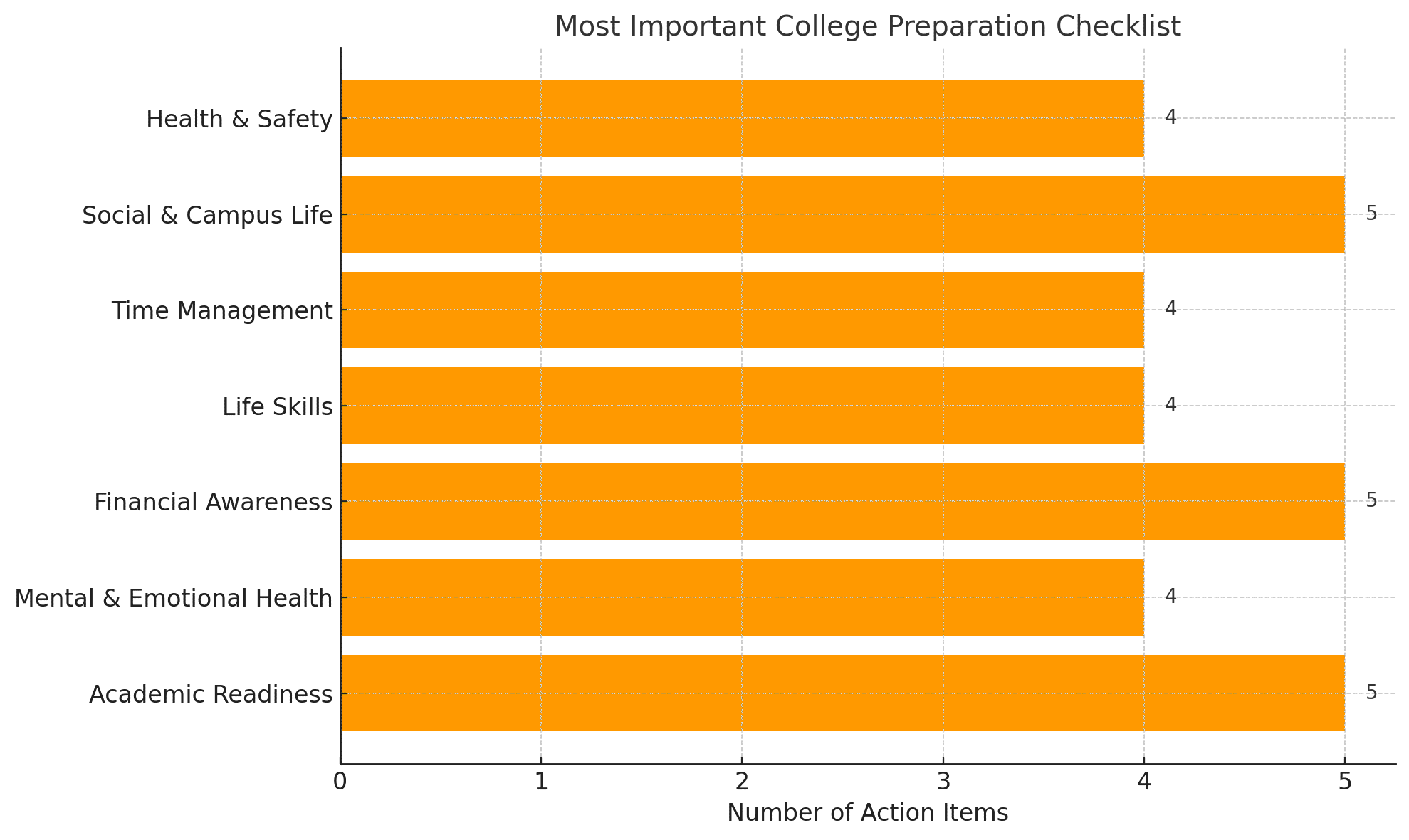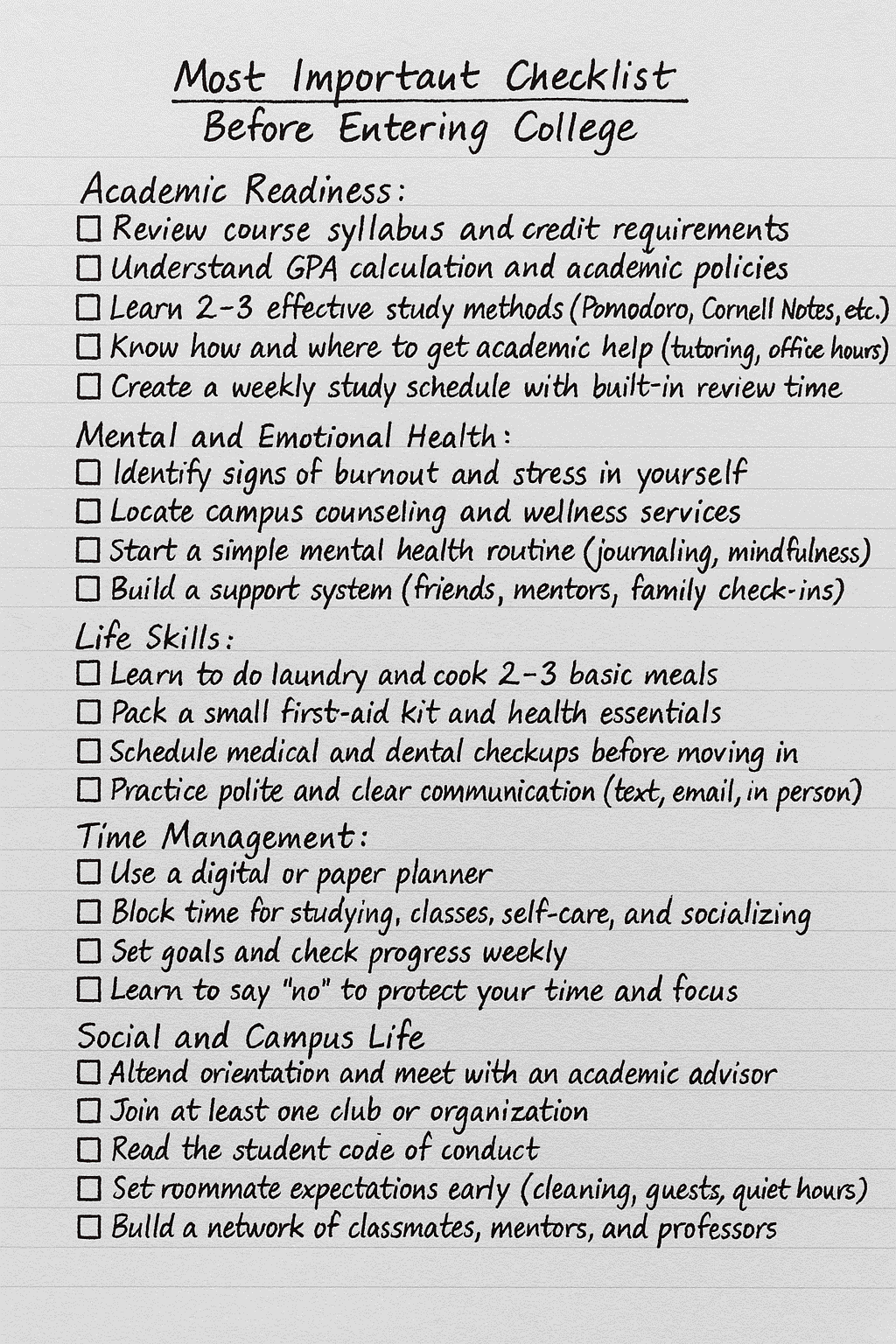
Why College Preparation Really Matters
College is more than lectures and grades—it's a significant shift in how you live, think, and take responsibility. Many students walk in with big expectations but feel lost quickly. According to National Center for Education Statistics data, around 24% of students leave college before their second year. The main reason? They weren’t ready for what was coming.
Take the example of Aarav, a freshman who thought college life would be simple. Within weeks, he struggled with deadlines, missed classes, and nearly failed his first exams. What held him back wasn’t intelligence, but the lack of awareness about what college involves.
This list includes 100 simple, practical, and honest things you should know before entering college, based on research, student experience, and academic reality.
Table of Content
- Why College Preparation Really Matters
- Academic Expectations and Study Habits
- Emotional and Mental Health Readiness
- Money Matters and Budgeting Skills
- Independent Living and Life Skills
- Social Skills and Campus Connections
- Health and Wellness on Campus
- Campus Culture and Expectations
- Technology, Safety, and Digital Awareness
- Conclusion
- FAQs

Academic Expectations and Study Habits
1–10: Understand the Curriculum and Course Load
-
Learn how credit hours impact your workload.
-
Review syllabi as soon as they’re available.
-
Don’t overload your schedule in the first semester.
-
Understand which classes are mandatory and which are electives.
-
Know how your GPA is calculated.
-
Familiarize yourself with course prerequisites.
-
Pay attention to add/drop deadlines.
-
Check professor ratings, but judge for yourself.
-
Learn your school’s academic integrity policies.
-
Be aware of academic probation and how to avoid it.
11–20: Effective Study Techniques That Work
-
Try the Pomodoro method for focused sessions.
-
Use Cornell notes for better memory retention.
-
Use flashcards with spaced repetition apps.
-
Avoid cramming—review regularly.
-
Study in shorter daily sessions, not long marathons.
-
Break big tasks into smaller steps.
-
Use study groups for accountability.
-
Record and re-listen to lectures when allowed.
-
Learn how to outline a textbook.
-
Get familiar with different learning styles.
21–25: Know Where and How to Ask for Help
-
Visit your professors during office hours.
-
Use the college’s tutoring center.
-
Find academic mentors or peer advisors.
-
Ask librarians about research tools.
-
Don’t wait until you're failing to seek help.
Emotional and Mental Health Readiness
26–30: Signs of Burnout to Watch For
-
Loss of motivation and constant fatigue.
-
Skipping classes or meals regularly.
-
Procrastination that turns into avoidance.
-
Constant self-doubt.
-
Irritability with roommates or peers.
31–35: Mental Health Support and Self-Care
-
Know where the counseling center is.
-
Practice mindfulness or light meditation.
-
Keep a journal to manage emotions.
-
Create a calming bedtime routine.
-
Don’t isolate—reach out when feeling overwhelmed.
Money Matters and Budgeting Skills
36–45: Financial Aid and Debt Awareness
-
Fill out FAFSA early each year.
-
Understand student loan terms.
-
Apply for multiple scholarships.
-
Track your loan balances regularly.
-
Set limits on borrowing.
-
Know if aid is renewable.
-
Don’t count on refund checks for lifestyle expenses.
-
Keep digital copies of financial aid documents.
-
Avoid unnecessary credit cards.
-
Understand work-study requirements.
46–50: Everyday Budgeting Basics
-
Track expenses daily for the first month.
-
Use budgeting apps that categorize spending.
-
Cook in bulk to save time and money.
-
Share streaming accounts with roommates.
-
Watch for small expenses—they add up.
Independent Living and Life Skills
51–60: Adulting 101
-
Know how to do your own laundry.
-
Learn basic cooking before college.
-
Carry a reusable water bottle.
-
Learn to schedule health appointments.
-
Understand over-the-counter medications.
-
Keep a basic first-aid kit.
-
Practice polite communication.
-
Know how to sew a button.
-
Set alarms—don’t rely on roommates.
-
Wash your sheets every two weeks.
61–65: Time Management Skills
-
Use a planner to organize your week.
-
Break your week into time blocks.
-
Limit distractions during study time.
-
Set both academic and personal goals.
-
Review your schedule every Sunday.
Social Skills and Campus Connections
66–70: Making Friends Without Pressure
-
Join interest-based clubs.
-
Attend mixers or welcome events.
-
Say hi to your neighbors or dormmates.
-
Find shared study spaces.
-
Be open to different cultures and ideas.
71–75: Boundaries and Communication
-
Discuss roommate agreements early.
-
Learn how to say no politely.
-
Use clear language in conflicts.
-
Avoid passive-aggressive notes.
-
Respect others’ privacy.
Health and Wellness on Campus
76–80: Know Your Health Services
-
Visit the health clinic before you get sick.
-
Check what services are included in your tuition.
-
Ask about mental health support groups.
-
Learn where to find condoms and emergency care.
-
Keep health insurance info easily accessible.
81–85: Staying Physically Well
-
Aim for 7–8 hours of sleep.
-
Stretch if you sit for long hours.
-
Avoid high-caffeine energy drinks.
-
Balance fast food with fruits or vegetables.
-
Move daily—even if it’s just walking.
Campus Culture and Expectations
86–90: Getting Involved and Staying Informed
-
Go to club fairs.
-
Attend student government meetings.
-
Sign up for the campus newsletter.
-
Follow your college’s social pages.
-
Meet student advisors or mentors.
91–95: Rules, Policies, and Responsibilities
-
Read the student handbook.
-
Understand plagiarism and how to avoid it.
-
Ask about dress codes or lab safety.
-
Learn your rights under Title IX.
-
Respect quiet hours in dorms.
Technology, Safety, and Digital Awareness
96–100: Stay Safe and Smart Online
-
Use strong passwords and change them often.
-
Enable two-step verification.
-
Don’t share your location publicly online.
-
Keep devices locked when unattended.
-
Learn about phishing and online scams.

Conclusion
College is a big transition, but it shouldn’t be confusing. You can make smoother decisions and avoid common problems with the proper knowledge. Learning how to manage your time, finances, health, and relationships early helps you focus on what college should truly offer: growth, learning, and finding your direction.
Whether you’re weeks away from your first class or still deciding what to pack, these 100 reminders will help you feel more in control and confident.
FAQs
1. What’s one thing most students forget to prepare for?
Time management. Students often underestimate how quickly deadlines pile up without planning.
2. How do I find a mentor in college?
Talk to professors or join academic clubs. Many campuses have mentoring programs.
3. What’s the biggest academic mistake first-year students make?
Skipping classes early in the semester, thinking it won’t matter. It adds up fast.
4. How do I save money as a student?
Use your student ID for discounts, buy used books, and cook meals at home.
5. How can I handle stress better?
Break large tasks into smaller ones, talk to someone you trust, and take breaks when needed.





